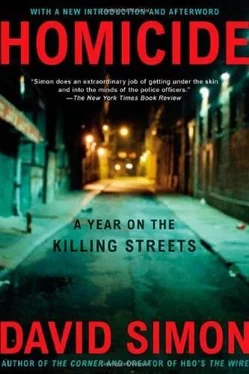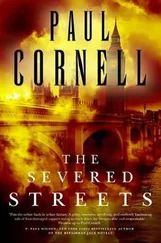You hesitate.
Oh, says the detective. You want to think about it. Hey, you think about it all you want, pal. My captain’s right outside in the hallway, and he already told me to charge your ass in the first fuckin’ degree. For once in your beshitted little life someone is giving you a chance and you’re too fucking dumb to take it. What the fuck, you go ahead and think about it and I’ll tell my captain to cool his heels for ten minutes. I can do that much for you. How ’bout some coffee? Another cigarette?
The detective leaves you alone in that cramped, windowless room. Just you and the blank notepaper and the Form 69 and… first-degree murder. First-degree murder with witnesses and fingerprints and blood on your Air Jordans. Christ, you didn’t even notice the blood on your own fucking shoes. Felony murder, mister. First-fucking-degree. How many years, you begin to wonder, how many years do I get for involuntary manslaughter?
Whereupon the man who wants to put you in prison, the man who is not your friend, comes back in the room, asking if the coffee’s okay.
Yeah, you say, the coffee’s fine, but what happens if I want a lawyer?
The detective shrugs. Then we get you a lawyer, he says. And I walk out of the room and type up the charging documents for first-degree murder and you can’t say a fucking thing about it. Look, bunk, I’m giving you a chance. He came at you, right? You were scared. It was self-defense.
Your mouth opens to speak.
He came at you, didn’t he?
“Yeah,” you venture cautiously, “he came at me.”
Whoa, says the detective, holding up his hands. Wait a minute. If we’re gonna do this, I gotta find your rights form. Where’s the fucking form? Damn things are like cops, never around when you need ’em. Here it is, he says, pushing the explanation-of-rights sheet across the table and pointing to the bottom. Read that, he says.
“I am willing to answer questions and I do not want any attorney at this time. My decision to answer questions without having an attorney present is free and voluntary on my part.”
As you read, he leaves the room and returns a moment later with a second detective as a witness. You sign the bottom of the form, as do both detectives.
The first detective looks up from the form, his eyes soaked with innocence. “He came at you, huh?”
“Yeah, he came at me.”
Get used to small rooms, bunk, because you are about to be drop-kicked into the lost land of pretrial detention. Because it’s one thing to be a murdering little asshole from Southeast Baltimore, and it’s another to be stupid about it, and with five little words you have just elevated yourself to the ranks of the truly witless.
End of the road, pal. It’s over. It’s history. And if that police detective wasn’t so busy committing your weak bullshit to paper, he’d probably look you in the eye and tell you so. He’d give you another cigarette and say, son, you are ignorance personified and you just put yourself in for the fatal stabbing of a human being. He might even tell you that the other witnesses in the other rooms are too drunk to identify their own reflections, much less the kid who had the knife, or that it’s always a long shot for the lab to pull a latent off a knife hilt, or that your $95 sneakers are as clean as the day you bought them. If he was feeling particularly expansive, he might tell you that everyone who leaves the homicide unit in handcuffs does so charged with first-degree murder, that it’s for the lawyers to decide what kind of deal will be cut. He might go on to say that even after all these years working homicides, there is still a small part of him that finds it completely mystifying that anyone ever utters a single word in a police interrogation. To illustrate the point, he could hold up your Form 69, on which you waived away every last one of your rights, and say, “Lookit here, pistonhead, I told you twice that you were deep in the shit and that whatever you said could put you in deeper.” And if his message was still somehow beyond your understanding, he could drag your carcass back down the sixth-floor hallway, back toward the sign that says Homicide Unit in white block letters, the sign you saw when you walked off the elevator.
Now think hard: Who lives in a homicide unit? Yeah, right. And what do homicide detectives do for a living? Yeah, you got it, bunk. And what did you do tonight? You murdered someone.
So when you opened that mouth of yours, what the fuck were you thinking?
Homicide detectives in Baltimore like to imagine a small, open window at the top of the long wall in the large interrogation room. More to the point, they like to imagine their suspects imagining a small, open window at the top of the long wall. The open window is the escape hatch, the Out. It is the perfect representation of what every suspect believes when he opens his mouth during an interrogation. Every last one envisions himself parrying questions with the right combination of alibi and excuse; every last one sees himself coming up with the right words, then crawling out the window to go home and sleep in his own bed. More often than not, a guilty man is looking for the Out from his first moments in the interrogation room; in that sense, the window is as much the suspect’s fantasy as the detective’s mirage.
The effect of the illusion is profound, distorting as it does the natural hostility between hunter and hunted, transforming it until it resembles a relationship more symbiotic than adversarial. That is the lie, and when the roles are perfectly performed, deceit surpasses itself, becoming manipulation on a grand scale and ultimately an act of betrayal. Because what occurs in an interrogation room is indeed little more than a carefully staged drama, a choreographed performance that allows a detective and his suspect to find common ground where none exists. There, in a carefully controlled purgatory, the guilty proclaim their malefactions, though rarely in any form that allows for contrition or resembles an unequivocal admission.
In truth, catharsis in the interrogation room occurs for only a few rare suspects, usually those in domestic murders or child abuse cases wherein the leaden mass of genuine remorse can crush anyone who is not hardened to his crime. But the greater share of men and women brought downtown take no interest in absolution. Ralph Waldo Emerson rightly noted that for those responsible, the act of murder “is no such ruinous thought as poets and romancers will have it; it does not unsettle him, or frighten him from his ordinary notice of trifles.” And while West Baltimore is a universe or two from Emerson’s nineteenth-century Massachusetts hamlet, the observation is still useful. Murder often doesn’t unsettle a man. In Baltimore, it usually doesn’t even ruin his day.
As a result, the majority of those who acknowledge their complicity in a killing must be baited by detectives with something more tempting than penitence. They must be made to believe that their crime is not really murder, that their excuse is both accepted and unique, that they will, with the help of the detective, be judged less evil than they truly are.
Some are brought to that unreasoned conclusion by the suggestion that they acted in self-defense or were provoked to violence. Others fall prey to the notion that they are less culpable than their colleagues-I only drove the car or backed up the robbery, I wasn’t the triggerman; or yeah, I raped her, but I stayed out of it when them other guys started strangling her-unaware that Maryland law allows every member of the conspiracy to be charged as a principal. Still others succumb to the belief that they will get a better shake by cooperating with detectives and acknowledging a limited amount of guilt. And many of those who cannot be lured over the precipice of self-incrimination can still be manipulated into providing alibis, denials and explanations-statements that can be checked and rechecked until a suspect’s lies are the greatest evidentiary threat to his freedom.
Читать дальше












